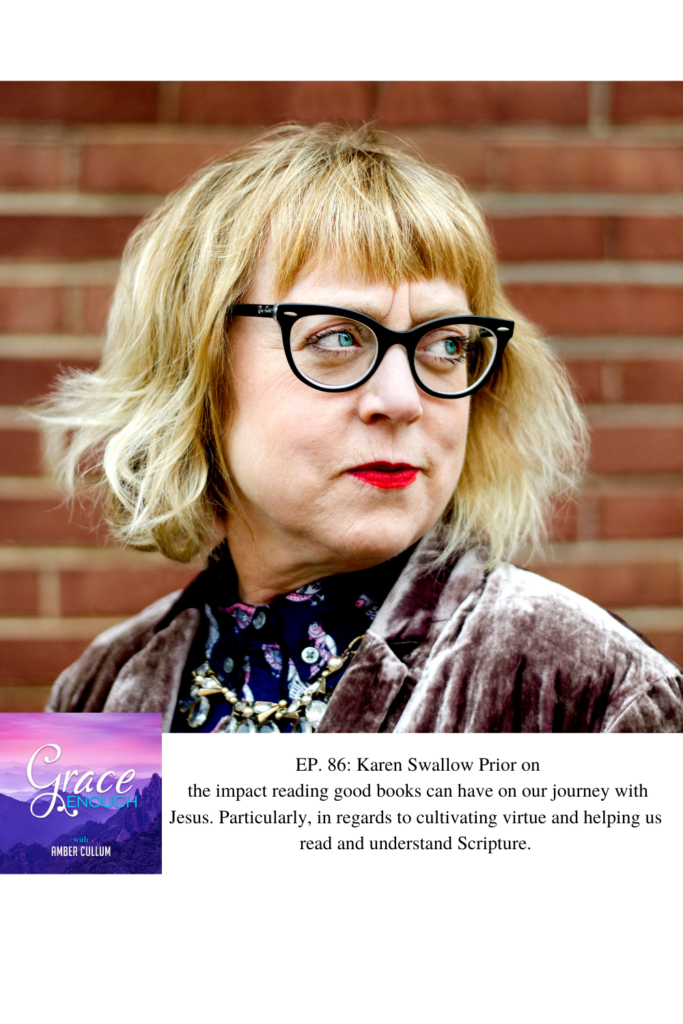
Karen Swallow Prior, Ph. D., is Research Professor of English and Christianity and Culture at Southeastern Baptist Theological Seminary.
She is the author of Booked: Literature in the Soul of Me (T. S. Poetry Press, 2012), Fierce Convictions: The Extraordinary Life of Hannah More—Poet, Reformer, Abolitionist (Thomas Nelson, 2014), and On Reading Well: Finding the Good Life through Great Books (Brazos 2018).
She is co-editor of Cultural Engagement: A Crash Course in Contemporary Issues (Zondervan 2019) and has contributed to numerous other books.
Her writing has appeared at Christianity Today, The Atlantic, The Washington Post, First Things, Vox, Relevant, Think Christian, The Gospel Coalition, Religion News Service, Books and Culture and other places.
She is a founding member of The Pelican Project, a Senior Fellow at the Trinity Forum, a Senior Fellow at the International Alliance for Christian Education, and a member of the Faith Advisory Council of the Humane Society of the United States.
She and her husband live on a 100-year old homestead in central Virginia with sundry horses, dogs, and chickens. And lots of books.
Karen Swallow Prior joins me on Grace Enough Podcast to discuss the impact reading good books can have on our journey with Jesus, particularly as it relates to cultivating virtue and helping us read and understand Scripture.
“For me, love of books and love of Jesus are so intertwined, I can hardly disconnect them.”
“As I grew older, and became more interested in the mind, and the intellect that books cultivates, I didn’t see a lot of space for that in the church. And for a long time, I didn’t see how the two went together. It really wasn’t until I was completing my PhD that I, through a number of circumstances, figured out, wow, the love that I have for words comes from the Creator of the Word.”
“From Aristotle on, it was understood that the happiest, best life that one could have was being virtuous, excelling at the very things that make us human. And there are ways of understanding that in a pagan, philosophical way, and there are ways of understanding that as a Christian believer, and there’s a great deal of overlap. They aren’t the same, but there is a great deal of overlap, because even the pagan Greeks and Romans understood that there’s something different about human beings, that we have a different nature and design. And it is by fulfilling that nature and design that we have the best life.”
“What he [Aristotle] meant by virtue is that when we practice a skill or habit enough, it actually becomes second nature to us.”
“The Bible tells us that when we are born again, we are new creatures. So we actually do have a new nature. It’s there. It’s fighting with the old man in us, but we have that ability to cultivate that new nature. But it’s still something that we have to do intentionally.”
“Literature is a form of art that uses words in the same way that a painter uses painting, or a sculptor uses marble or wood. People who write literary works, use words. And of course, the Bible uses words, it’s much more than a literary work, but it is a beautiful work of language.”
“We are people of the word. And God chose…to reveal Himself to us through words, small w and also through the Word, His Son, who is called the Word. And so there’s something about our very nature that understands God through language, through the Word.”
“I think a lot of people are intimidated by the idea of reading great works of literature, because it’s a habit that hasn’t been cultivated. But it is a habit that can be cultivated.”
“The biggest mistake I see people make, and especially my students is to try to read literary works too fast.”
“Justice is the virtue that is complicated because we can be just or unjust as individuals, but justice also deals with our community, our world…All the other virtues have to do with our own personal piety, but justice also describes the world we live in.”
“Virtue is always the moderation between an excess and a deficiency, but our human tendency…whenever we see a wrong or feel an injustice, when we want to correct it, the tendency is too overcorrect.”



© Grace Enough Podcast2024